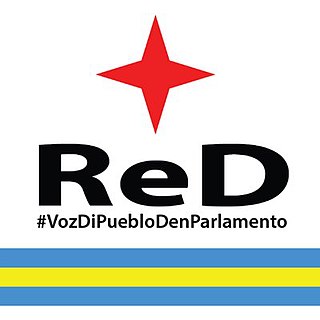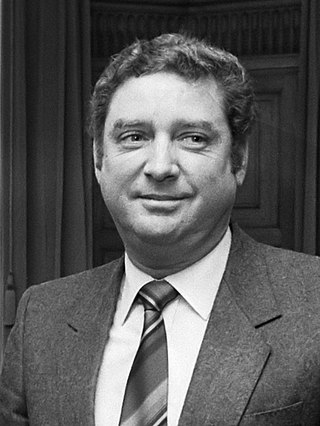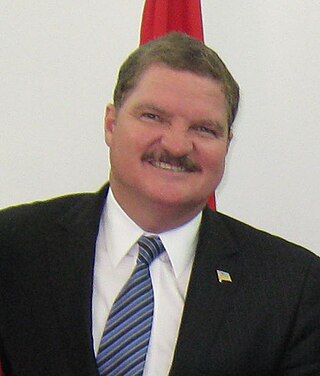
Politics of Aruba, a constituent country of the Kingdom of the Netherlands, takes place in a framework of a parliamentary representative democratic country, whereby the governor in his capacity as the King's representative is the de jure head of government and of a multi-party system. Executive power is exercised by the government. Federal legislative power is vested in both the government and the Parliament. The Judiciary is independent of the executive and the legislature. Aruba has full autonomy on most matters. Exceptions are defense, foreign affairs, and the Supreme Court. The constitution was enacted in 1986.

Nelson Orlando Oduber is a retired Aruban politician who served as the 2nd Prime Minister of Aruba. Following his defeat in the 2009 Aruban general election, Oduber retired from politics.

Gilberto François "Betico" Croes was an Aruban political activist who was a proponent for Aruba's separation from the Netherlands Antilles. This eventually occurred in 1986, but following a car accident on 31 December 1985, Croes lapsed into a coma and never became conscious to see his accomplishment. He is best remembered as "Libertador" (liberator) and as the father of the Aruban people.

The People's Electoral Movement is a social democratic political party in Aruba. Following the 2001 general election for the Parliament of Aruba the party won 52.4% of popular vote and 12 out of 21 seats. In the 2005 general election, the party won 43% of the popular vote and 11 out of 21 seats thus won the election and remained in power. In the 2009 general election, MEP lost 2 seats and won 36% of the vote, subsequently losing the election.
Jossy Mehsen Mansur was the editor of the Papiamento-language newspaper Diario in Aruba. He wrote two dictionaries for the Papiamento language and a history of Aruba among other books.

Democratic Network is a progressive, green political party in Aruba. Since the 2017 Aruban general election it has one seat in the Estates of Aruba and is part of the government coalition under Prime Minister Evelyn Wever-Croes.

Jan Hendrik Albert "Henny" Eman is an Aruban retired politician. He was the first Prime Minister of Aruba from 1 January 1986 to 9 February 1989 and again from 29 July 1994 to 30 October 2001.
Francisco Walfrido "Frido" Croes was an Aruban politician and schoolteacher who held the office of Minister Plenipotentiary of Aruba from 2005 to 2009. Prior to that, he served as a member of the Estates of Aruba from 1989 to 1994, and as its President from 2001 to 2004. He also served as Minister of Education from 2004 to 2005.

General elections were held in Aruba on 25 September 2009. The elections were the seventh to be held for membership of the Estates since autonomy was granted by the Dutch in 1986, and resulted in a landslide victory for the Aruban People's Party, which won 12 of the 21 seats in the Estates.

Michiel Godfried "Mike" Eman is an Aruban politician who served as the 3rd Prime Minister of Aruba from 2009 to 2017. His political career began in 2001, but Eman has been involved in politics in one way or another since his childhood. His grandfather, father and brother were all prominent politicians in their lifetimes, with Henny Eman having preceded him in office (twice) as Prime Minister, including as the first to hold the office after Aruba's status aparte in 1986.

Evelyna Christina "Evelyn" Wever-Croes is an Aruban politician and current Prime Minister of Aruba, serving since November 2017. She is the first woman to hold this office. She is a member of the People's Electoral Movement (MEP) and has been the leader of the party since 2011.

Juan David Yrausquin is an Aruban politician. He was Minister Plenipotentiary of Aruba between 17 November 2016 and 20 November 2017. He was Minister of Finance between 2013 and 2014 in the second Mike Eman cabinet.
Francisco Dominico "Frans" Figaroa was an Aruban politician who served as Lieutenant governor of Aruba from 1979 until 1982, figaroa previously served as President of the Parliament of the Netherlands Antilles (1973-1979) and Minister of Education of the Netherlands Antilles (1961-1962), Figaroa also served as chairman of the Aruba Football Federation and chairman of the Netherlands Antilles Olympic Committee.
Pauldrick François Teodoric"Paul"Croes is a former Aruban politician who served as the Minister of Social Affairs, Youth and Labor in the Second Eman Cabinet from 2013 to 2017. As a member of the Aruban People's Party, he was a member of the Parliament of Aruba between 2009 and 2013.

Danguillaume Pierino Oduber is an Aruban politician serving as Minister of Tourism and Public Health in the second Wever-Croes Cabinet. He previously served as a member of Parliament

General elections were held in Aruba on 8 January 1993. The Aruban People's Party and People's Electoral Movement (MEP) both won nine seats in the 21-seat Estates. The MEP remained in government with a three-party coalition headed by Nelson Oduber as Prime Minister.

General elections were held in Aruba on 7 January 1989. The People's Electoral Movement (MEP) emerged as the largest party, winning ten of the 21 seats in the Estates. The MEP formed a three-party coalition government with the Aruban Democratic Party and the Aruban Patriotic Party, with Nelson Oduber becoming prime minister.
Alicia Angela Tromp-Yarzagaray, known as Ella Tromp-Yarzagaray, is an Aruban former politician of the People's Electoral Movement party. She was the first woman to hold the positions of Minister of Finance and Minister Plenipotentiary in the country.
The first Wever-Croes cabinet was the cabinet of Aruba from 17 November 2017 to 20 September 2021. It was formed by a coalition government of the political parties People's Electoral Movement (MEP), Proud and Respected People (POR) and Democratic Network (RED), and was led by Prime Minister Evelyn Wever-Croes. It was the country's first coalition government in sixteen years and the first cabinet to be headed by a woman.
The second Wever-Croes cabinet is the current cabinet of Aruba. It was installed on 20 September 2021 by Deputy Governor Yvonne Laclé-Dirksz. The cabinet is formed by a coalition government of the center-left political parties People's Electoral Movement (MEP) and RAIZ, and is led by Prime Minister Evelyn Wever-Croes.











